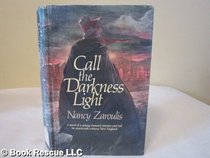If women think the workplace today is unfair, reading this story will bring an appreciation for our current employment regulations in the US.
I know there are still illegal sweatshops and many women still have terrible working conditions.
I found the characters and the story line very engaging.
I gifted my copy to my 20-something grand-daughter in the hopes she might read it and gain some direction and insight.Perhaps...
I know there are still illegal sweatshops and many women still have terrible working conditions.
I found the characters and the story line very engaging.
I gifted my copy to my 20-something grand-daughter in the hopes she might read it and gain some direction and insight.Perhaps...
this book takes you back in time to the textile factories and the plight of the women workers also some love and heartbreak.
FROM THE PUBLISHER
Call The Darkness Light is an epic novel of a young woman's passionate struggle for independence in 19th century America.
Set in Massachusetts during the two decades before the Civil War, the novel tells the story of Sabra Palfrey - a Lowell "mill girl" who with her sister weavers and spinners was one of the first generation of American women to work and live apart from the traditional patriarchal family. It encompasses an entire panorama of nineteenth century New England: the Utopian dreamers; adherents of new religions like the Shakers and MIllenarians; the abolitionists; and the onrushing immigrants from war-torn, starving Europe - Irish, German and others.
FROM THE CRITICS
Publishers Weekly
A vivid and sweeping novel about the life of a female mill worker in industrial Lowell, Mass., in the mid-19th century. (Nov.)
Call The Darkness Light is an epic novel of a young woman's passionate struggle for independence in 19th century America.
Set in Massachusetts during the two decades before the Civil War, the novel tells the story of Sabra Palfrey - a Lowell "mill girl" who with her sister weavers and spinners was one of the first generation of American women to work and live apart from the traditional patriarchal family. It encompasses an entire panorama of nineteenth century New England: the Utopian dreamers; adherents of new religions like the Shakers and MIllenarians; the abolitionists; and the onrushing immigrants from war-torn, starving Europe - Irish, German and others.
FROM THE CRITICS
Publishers Weekly
A vivid and sweeping novel about the life of a female mill worker in industrial Lowell, Mass., in the mid-19th century. (Nov.)




